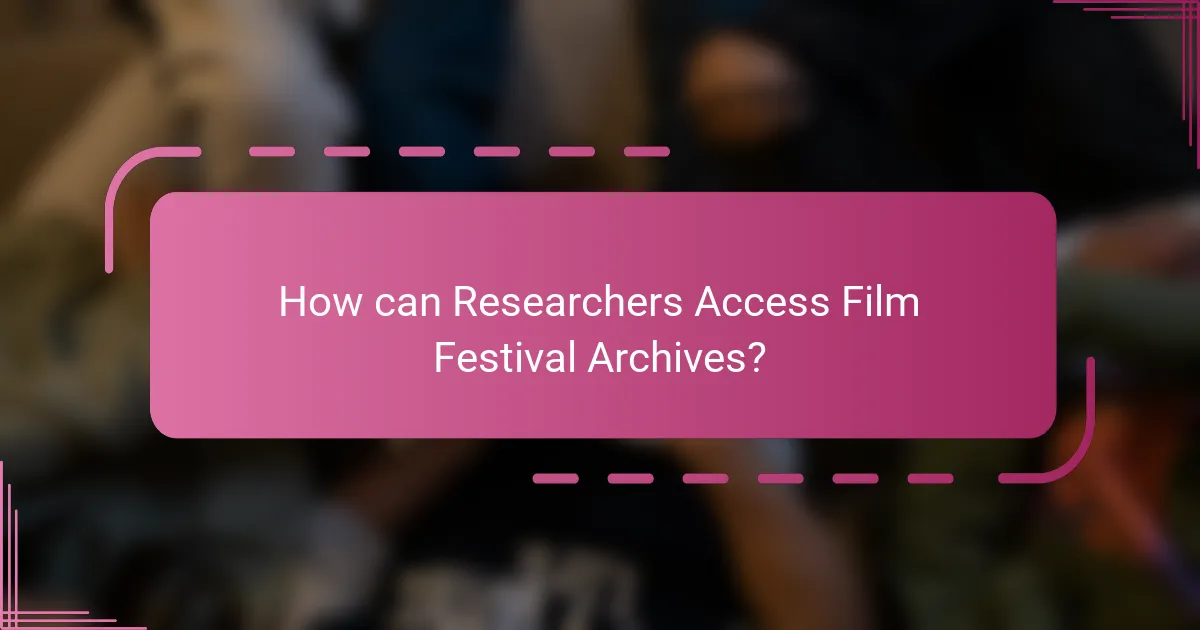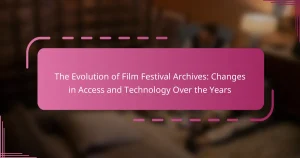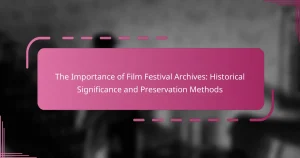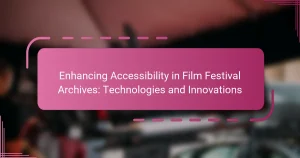Film festival archives are essential collections that include films, promotional materials, and documentation related to film festivals. These archives serve as crucial resources for researchers examining film history, cultural trends, and industry practices, preserving the legacy of showcased films and offering insights into cinema’s evolution. Accessing these archives can be done through online databases, physical locations, or university collections, with specific guidelines for researchers to follow. Best practices for citing materials from film festival archives emphasize the importance of detailed information about the film, festival, and archive to ensure academic credibility and clarity in research.

What are Film Festival Archives and Their Importance in Research?
Film festival archives are collections of materials related to film festivals, including films, promotional materials, and documentation. They serve as essential resources for researchers studying film history, cultural trends, and industry practices. These archives preserve the legacy of films showcased at festivals, offering insights into the evolution of cinema. Researchers access these archives to analyze patterns in film selection, audience reception, and critical discourse. The importance of film festival archives lies in their ability to provide primary sources that enhance scholarly understanding. They contribute to the documentation of cultural history and the development of film studies as an academic discipline.
How do Film Festival Archives support academic and creative research?
Film Festival Archives support academic and creative research by providing access to a wealth of audiovisual materials. These archives preserve films, scripts, and promotional materials from various festivals. Researchers can analyze trends in film history and cultural representation through these resources. Additionally, archives often include filmmaker interviews and panel discussions that offer insights into creative processes. They serve as primary sources for academic studies, enhancing the credibility of research. Many archives also provide digitized collections, making materials accessible to a broader audience. This accessibility fosters interdisciplinary research, bridging film studies with other fields. Overall, Film Festival Archives are vital for preserving film heritage and supporting scholarly inquiry.
What types of materials are typically found in Film Festival Archives?
Film Festival Archives typically contain a variety of materials. These include film prints and digital copies of screened films. Additionally, there are promotional materials such as posters and brochures. Archival documents often include program guides and festival catalogs. Press kits and media coverage are also common. Interviews with filmmakers and audience feedback may be archived. Photographs capturing festival events and attendees are frequently included. Finally, administrative records related to festival organization and funding are often stored.
How do these materials enhance the understanding of film culture?
Film festival archives enhance the understanding of film culture by providing access to historical documents and materials. These resources include film programs, promotional materials, and audience feedback. They offer insights into the trends and themes prevalent during specific periods. Researchers can analyze how films reflect societal values and cultural shifts. Archives also preserve unique films that may not be widely available. This contributes to a more comprehensive understanding of diverse cinematic expressions. By studying these materials, scholars can connect films to broader cultural movements and discussions. This connection enriches the academic discourse surrounding film studies.
What role do Film Festival Archives play in preserving cinematic history?
Film Festival Archives play a crucial role in preserving cinematic history. They serve as repositories for films, documents, and materials related to film festivals. These archives maintain the original works of filmmakers and showcase the evolution of cinema over time. They often include unique items such as scripts, promotional materials, and photographs. This collection aids researchers and historians in studying trends and cultural impacts in film. Many archives also digitize their collections, making them accessible to a wider audience. This accessibility ensures that future generations can explore and understand cinematic heritage. By documenting festival screenings, these archives highlight the significance of diverse voices in film history.
Why is the preservation of film festival materials critical for future research?
The preservation of film festival materials is critical for future research because it ensures access to historical and cultural artifacts. These materials serve as primary sources for understanding film history, trends, and audience reception. They include scripts, promotional materials, and audience feedback, which provide context for academic analysis. Research has shown that archived festival materials can reveal shifts in cinematic narratives and industry practices over time. Additionally, they support the study of underrepresented filmmakers and diverse voices in cinema. The Library of Congress notes that preserving such materials contributes to a comprehensive understanding of cultural heritage. Without preservation, valuable insights into the evolution of film and its societal impact may be lost.
How do archives maintain the integrity of historical film data?
Archives maintain the integrity of historical film data through rigorous preservation techniques. They employ controlled environments to store film materials, regulating temperature and humidity. Digital backups are created to prevent data loss from physical deterioration. Metadata is meticulously documented to ensure accurate cataloging and retrieval. Regular audits are conducted to assess the condition of film assets. Restoration processes are applied when necessary to repair damaged films. Collaboration with experts in film preservation enhances their methodologies. These practices are supported by guidelines from organizations like the International Federation of Film Archives.

How can Researchers Access Film Festival Archives?
Researchers can access film festival archives through various methods. Many film festivals maintain online databases that include archived materials. These databases often contain information about past films, schedules, and participant details. Researchers can also visit physical archive locations associated with specific festivals. Some festivals provide access to their archives by appointment or during specific hours. Additionally, universities and libraries may house collections of festival materials. Researchers should check the specific festival’s website for access guidelines. Some archives may require registration or membership for access. Collaboration with festival staff can also facilitate access to restricted materials.
What are the common methods for accessing these archives?
Common methods for accessing film festival archives include online databases, physical visits, and interlibrary loans. Online databases provide digital access to archived films, documents, and festival records. Many film festivals maintain official websites with searchable archives. Physical visits to archive locations allow researchers to access materials not available online. These visits often require appointments and adherence to specific access policies. Interlibrary loans enable researchers to request materials from other libraries that hold festival archives. This method expands access to resources across institutions.
How do online databases facilitate access to Film Festival Archives?
Online databases enhance access to Film Festival Archives by providing centralized platforms for information retrieval. They enable users to search for films, screenings, and related materials efficiently. Many databases offer advanced search features, allowing for filtering by year, genre, and filmmaker. This specificity aids researchers in locating relevant content quickly. Additionally, online databases often include digitized documents, such as program guides and press releases. This digitization makes historical materials more accessible than traditional archives. Furthermore, databases may feature user-friendly interfaces that simplify navigation. They also support remote access, allowing users to engage with archives from anywhere. Overall, these features significantly improve the accessibility of Film Festival Archives for research purposes.
What are the challenges researchers face when accessing physical archives?
Researchers face several challenges when accessing physical archives. Limited accessibility is a primary issue. Many archives have restricted hours or require appointments for entry. Physical condition of materials can also pose difficulties. Some documents may be fragile or deteriorating, limiting their usability. Additionally, researchers often encounter inadequate cataloging. Poor organization can make it hard to locate specific items. Staff availability can further complicate access. Sometimes, archivists may not be present to assist researchers. Lastly, geographical location can be a barrier. Archives may be situated far from researchers’ institutions, increasing travel costs and time. These factors collectively hinder effective research in physical archives.
What resources are available for researchers utilizing Film Festival Archives?
Researchers utilizing Film Festival Archives have access to various resources. These include digital collections of festival films, screening schedules, and archival footage. Many archives provide access to festival programs and catalogs. Researchers can also find press releases and promotional materials related to films and filmmakers. Some archives offer access to interviews with filmmakers and industry professionals. Additionally, databases may include academic articles analyzing festival films. Online platforms often host forums for discussion and collaboration among researchers. These resources facilitate in-depth research and analysis of film festival histories and trends.
What types of digital tools aid in navigating Film Festival Archives?
Digital tools that aid in navigating Film Festival Archives include online databases, digital catalogs, and archival management software. Online databases provide access to a vast range of festival records and filmographies. Digital catalogs allow users to search for specific films, directors, or festival years. Archival management software helps organize and preserve digital assets related to film festivals. These tools enhance accessibility and streamline research processes. For instance, platforms like IMDb and Archive.org host extensive film festival information. Such resources improve the efficiency of locating archival content and facilitate comprehensive research.
How can researchers effectively utilize archival catalogs and databases?
Researchers can effectively utilize archival catalogs and databases by conducting thorough searches using specific keywords. They should familiarize themselves with the cataloging system to navigate efficiently. Utilizing filters for date, genre, and format can streamline the search process. Researchers should also take advantage of metadata, which provides essential context about the materials. Cross-referencing multiple databases can yield comprehensive results. Engaging with archival staff can provide insights and guidance on accessing hidden resources. Documenting sources accurately is crucial for citation practices. This approach enhances the quality and credibility of research findings.

What are Best Practices for Citing Film Festival Archives?
Best practices for citing film festival archives include providing specific details about the film, festival, and archive. Always include the title of the film, director’s name, and year of release. Specify the name of the film festival where the film was showcased. Include the location and date of the festival. If available, reference the archive’s name and any unique identifiers such as an accession number. Use a consistent citation style, such as APA or MLA, to maintain clarity. Following these practices ensures accurate representation of the source material. This approach aligns with academic standards for citation and enhances research credibility.
How should researchers cite materials from Film Festival Archives?
Researchers should cite materials from Film Festival Archives by following established citation formats. Common formats include APA, MLA, or Chicago style. The citation should include the title of the work, the festival name, the date, and the location. For example, in APA style, a citation might look like this: “Title of Film” (Year). Film Festival Name, Location. This format ensures that all relevant details are provided for proper attribution. Accurate citations allow others to locate the same materials easily. Following these guidelines promotes academic integrity and supports scholarly communication.
What citation styles are commonly used for archival materials?
Common citation styles for archival materials include Chicago, MLA, and APA. Chicago style is often used for historical documents and primary sources. It provides guidelines for citing personal papers and institutional archives. MLA is favored in humanities disciplines and emphasizes authorship and publication details. APA is commonly used in social sciences, focusing on the date of access and retrieval information. Each style has specific rules for citing archival materials, ensuring proper attribution and context.
What specific information is crucial for accurate citations?
Accurate citations require specific information to ensure credibility and traceability. Key elements include the author’s name, publication date, title of the work, and source details. For articles, include the journal name, volume, and issue number. For books, list the publisher and location. When citing online resources, provide the URL and access date. Each element contributes to the citation’s reliability. According to the American Psychological Association (APA) guidelines, these details support proper attribution and allow readers to locate the original source.
What common mistakes should researchers avoid when citing Film Festival Archives?
Researchers should avoid several common mistakes when citing Film Festival Archives. One mistake is failing to provide complete citation details. This includes missing the title, date, and location of the festival. Incomplete citations can lead to difficulties in locating the original source. Another mistake is not adhering to the specific citation style required for the research. Different styles, such as APA or MLA, have unique requirements for citing archival materials.
Additionally, researchers often overlook the importance of contextualizing the source. Providing background information about the film festival enhances understanding. Failing to do so can diminish the significance of the cited work. Researchers may also neglect to verify the authenticity of the archives. Using unverified sources can lead to misinformation in research.
Finally, another common mistake is not checking for updates or changes in the archive’s access policies. Film festivals may revise their archival practices, impacting citation validity. By avoiding these mistakes, researchers can ensure accurate and effective citations of Film Festival Archives.
How can improper citations impact academic integrity?
Improper citations can significantly undermine academic integrity. They can lead to accusations of plagiarism, which is a serious ethical violation in academia. When sources are not accurately credited, it misrepresents the original author’s work. This can diminish the credibility of the researcher and their findings. Academic institutions often impose strict penalties for plagiarism. Such penalties can include failing grades or expulsion. Furthermore, improper citations can hinder the advancement of knowledge. They create confusion regarding the original sources and ideas. This impacts the scholarly community’s ability to build on existing research effectively.
What resources can help ensure correct citation practices?
Citation style guides can help ensure correct citation practices. Resources such as the American Psychological Association (APA) Style Manual provide detailed guidelines for citations. The Modern Language Association (MLA) Handbook offers comprehensive citation rules for various sources. The Chicago Manual of Style is another essential resource for citation standards. Online citation generators like Citation Machine and EasyBib assist in creating accurate citations. University writing centers often provide resources and workshops on citation practices. Additionally, academic databases like JSTOR and Google Scholar include citation features for referenced works. These resources collectively support accurate and consistent citation practices in research.
What are some tips for effectively using Film Festival Archives in research?
Utilize Film Festival Archives by starting with a clear research question. This guides your search for relevant materials. Focus on specific festivals that align with your topic. Each festival often has unique themes and focuses. Explore the archives for program booklets, press releases, and film catalogs. These documents provide context and background information. Use digital databases for easier access to archived materials. Many film festivals maintain online repositories. Take detailed notes on your findings for accurate citations. Proper citation is crucial for academic integrity and research validity.
Film festival archives are vital collections that preserve materials related to film festivals, including films, promotional content, and documentation, serving as essential resources for researchers in film studies. This article explores the significance of these archives in supporting academic and creative research, detailing the types of materials available and their role in enhancing understanding of film culture and preserving cinematic history. It also discusses methods for accessing these archives, best practices for citing archival materials, and common challenges researchers face. By examining these aspects, the article highlights the importance of film festival archives in contributing to scholarly inquiry and the documentation of cultural heritage.


